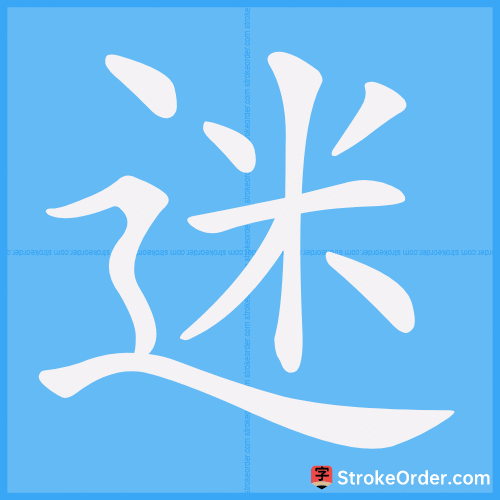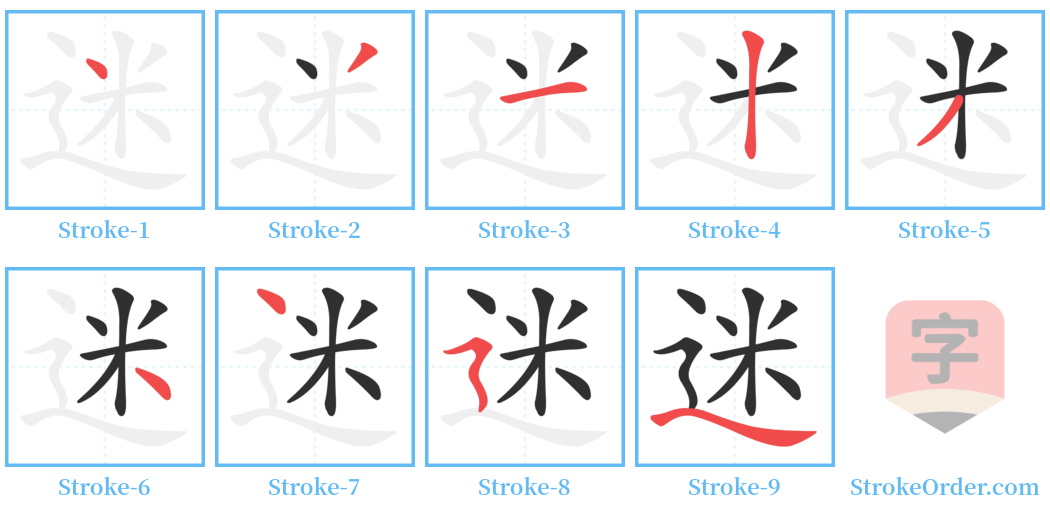迷 Stroke Order
Animated Stroke Order of 迷

Stroke Order Diagrams for 迷

Step-by-Step Handwriting Guide for 迷

Learn to Write Chinese Characters with Video Tutorials
Watch the video of writing the Chinese character "迷", learn the correct stroke order (笔顺) of the character "迷", and master the standard way of writing the character "迷".
Free Printable Handwriting Practice with Stroke Order: 迷
Printable Writing Practice Worksheet of "迷" in Portrait Orientation (Tian Zi Ge)

Printable Writing Practice Worksheet of "迷" in Landscape Orientation (Tian Zi Ge)

Information of 迷
Pinyin
mí
Radical
辶
Strokes
9 strokes
Usage
★★★★★
Definition
bewilder / crazy about / fan / enthusiast / lost / confused
迷 [mí]
1. 分辨不清,失去了辨别、判断的能力。
[En.] To be unable to distinguish or to lose the ability to judge and discern.
2. 醉心于某种事物,发生特殊的爱好。
[En.] To be infatuated with something, developing a particular passion or hobby.
3. 沉醉于某种事物的人。
[En.] A person who is enraptured or enchanted by something.
4. 使人陶醉。
[En.] To make someone fascinated or intoxicated.
---
迷 [mí] (verb)
本义: 迷路; 分辨不清
[En.] Original meaning: To be lost; to be confused.
造字法: 形声。从辵( chuò),米声。
[En.] Phonetic and semantic formation: Derived from '辵' (chuò) and the phonetic '米'.
1. 同本义 ([En.] be lost; be confused)
引:
1. 《说文》:迷,惑也。
[En.] "Lost" means confusion.
2. 《书·舜典》:烈风雷雨弗迷。
[En.] "Strong winds and storms do not confuse."
3. 《韩非子·解老》:凡夫失其所欲之路,而妄行之,则为迷。
[En.] "Common people lose their desired path and act recklessly, thus becoming lost."
4. 《离骚》:及行迷之未远。
[En.] "When traveling, one does not stray far away."
5. 《楚辞·惜诵》:迷不知宠之门。
[En.] "Lost and unaware of the entrance to affection."
6. 《聊斋志异·促织》:迷其所在。
[En.] "Lost in its whereabouts."
7. 《楚辞·九章·涉江》:入溆浦余儃佪兮,迷不知吾所如。
[En.] "Entering the quiet pools, I am lost and know not where I go."
8. 杜牧《阿房宫赋》:高低冥迷,不知西东。
[En.] "In the heights and depths, I am lost and do not know east from west."
9. 晋· 陶渊明《桃花源记》:遂迷,不复得路。
[En.] "Thus lost, I can no longer find the way back."
10. 唐· 韩愈《朱文公校昌黎先生集》:其若迷。
[En.] "As if lost."
11. 无迷其途。
[En.] "No confusion in the path."
12. 清· 姚鼐《登泰山记》:道中迷雾。
[En.] "Misty road along the way."
例: 又如: 迷离徜彷(模糊不明); 迷罔; 迷岸(佛家语。指迷惑而不悟的生死流转世界)
[En.] For example: hazy wandering (ambiguous); perplexed; enchanted by the shore (Buddhist term referring to the world of life and death where one is perplexed and does not awaken).
---
2. 迷惑,使…辨不清 ([En.] delude; confuse)
引:
1. 唐· 白居易《钱塘湖春行》:乱花渐欲迷人眼,浅草才能没马蹄。
[En.] "The riot of flowers begins to confuse the eyes, only shallow grass can cover the horse's hooves."
例: 又如: 迷魂(迷惑人的事理,使人身不由己); 迷网(指迷惑人的事物像网罗一样,使人陷落而无以自拔); 迷夺时明(迷惑、剥夺当今明哲之士的舆论); 迷眩缠陷(以声色迷惑,为罗网陷阱); 迷途
[En.] For example: soul-ensnaring (the matters of confusion, making one unable to control oneself); deceptive net (things that confuse like a web, ensnaring one making escape impossible); confusing and depriving today's wise of their opinions; dazzling entrapment (to confuse with sound and color, being like a web trap); lost path.
---
3. 迷恋 ([En.] be addicted to; be infatuated with)
引:
1. 唐· 李白《梦游天姥吟留别》:迷花倚石忽已暝(迷恋着花,依倚着石,不觉天色已经晚了。暝,天黑、夜晚)。
[En.] "Enamored of flowers, leaning against the stones, unaware it has turned dark."
---
4. 昏迷 ([En.] fall into a stupor; be in a coma)
引:
1. 《列子·汤问》:扁鹊遂饮二人毒酒,迷死三日。
[En.] "Bian Que drank poison with two people, falling into a coma for three days."
---
迷 [mí] (noun)
狂热爱好者,通常是作为观众而非直接参加者 (【英】:fan; enthusiast)。如: 棒球迷; 芭蕾舞迷; 垒球迷; 惊险小说迷; 数学迷
[En.] An enthusiast or fanatic, typically as an audience member rather than a direct participant (English: fan; enthusiast). For example: baseball fan; ballet fan; softball fan; thriller novel fan; math enthusiast.
Input Method for 迷
Pinyin
mi2
Wubi
opi
Cangjie
yfd
Zhengma
ufw
Four Corner
39309
Unicode
U+8ff7
Same Pronunciation Characters